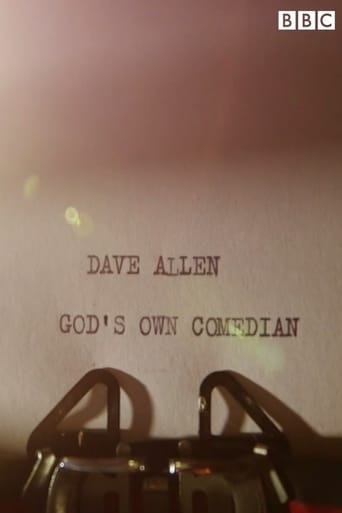jc-osms
This hour long BBC Northern Ireland tribute to the popular if controversial Irish comedian Dave Allen did justice to him I believe. I was a big fan of his early 70's BBC2 Show "Dave Allen At Large" and was interested to learn more about him. In truth his comedy shows probably haven't dated too well being occasionally un-P.C. in its depiction of women but he admirably took pot-shots at the Catholic religion, provoking much viewer anger especially in his home country even to the extent of garnering death threats.The show adopted the format of dropping in on key years in Allen's life, starting naturally with his formative years in Ireland. Much is made of the early loss of the tip of one of his fingers, the cause of which he retold in different ways throughout his career but the major influence on his early life appears to have been his newspaper editor father who died when he was only 12. Unusual I'd say that his mother didn't feature more despite living longer than her husband. I was surprised to learn that he made his name initially on Australian TV and then as an almost daredevil presenter back in Britain, as highlighted by a hair-raising stunt involving the submersion of a car. I knew already about his appearance on the same bill as the emerging Beatles in the early 60's. He really found his feet in his BBC series at the end of the 60's especially "At Large" when he interspersed his laconic sit-down joke-telling, cigarette and drink in hand, with zany comedy sketches, besides the religious ones I particularly recall with affection his regular "Mexican last request" skits. Due to his anti-establishment acerbic humour (even tackling apartheid in one sketch), he never became the type of TV dinosaur that the alternative comedians of the early 80's so aptly vilified, continuing on in TV specials into his older age, particularly highlighting eccentrics.Away from the camera, he was married twice, had children and interests in painting and gardening. He seemed to live a full and happy life with none of the familiar comedic demons at his back, dying too young at age 68.A comedic rebel, unafraid to tilt at established mores of the day (even to the extent of using the "F" word to embellish a joke), this was an enjoyable reminder that early 70's British humour wasn't all Benny Hill and Carry On.
l_rawjalaurence
Made with the co-operation of Allen's widow, DAVE ALLEN: GOD'S OWN COMIC charts the rise to fame of the comedian who changed his name so that he could be looked at first when it came to sorting through the lists of Equity members to engage for particular gigs. The "A's" would always be first; hence the name "Allen" might ensure the comedian's being booked.Allen first made his name on Australian television by hosting a live late-night chat Show a la David Frost. He enjoyed the freedom of being able to overrun if necessary; the scheduling allowed him to go beyond the scheduled running-time if the show proved interesting. Returning to the United Kingdom, Allen hosted another chat-show for ITV before joining the BBC in the late Sixties and beginning the series for which he is most remembered, DAVE ALLEN AT LARGE. A combination of comic monologues and short sketches, the show catapulted him to national fame as someone who was quite prepared to take on hitherto taboo subjects such as the Catholic religion as butts for his humor. Sometimes he caused offense, but for the most part viewers realized that his shows were basically good-natured in tone, laughing at people's absurdities rather than indulging in overt political satire.Allen also proved to be a highly adept documentary presenter; in the late Seventies and Eighties he did several shows both for the BBC and ITV in which he went to discover some of the eccentrics living in Britain. He encountered many examples; what made his shows memorable was the deadpan way in which he reacted to such people. Rather than laughing at them, he gave them both the time and space to express themselves, and thereby helped viewers understand why they had chosen to make such life-choices.Returning to mainstream comedy at the BBC and ITV in the Nineties, Allen caused a bit of a stir when he used the four-letter word in one of his shows. Nonetheless, he managed to attract high ratings, even if his humor was a little more acerbic than it had been two decades previously.He died in 2005, aged only sixty-eight; but what the program suggested was that he was a fundamentally happy man who had achieved most of his ambitions, whether personal or professional. His legacy lives on in an archive of televisual material that stands the test of time.

